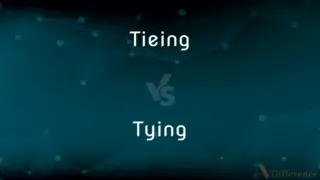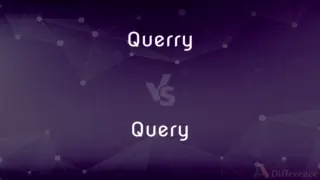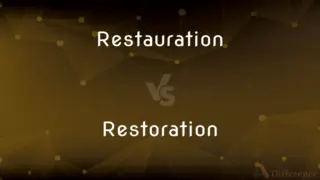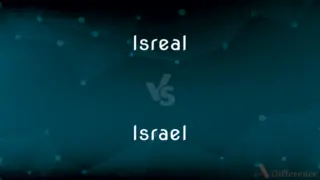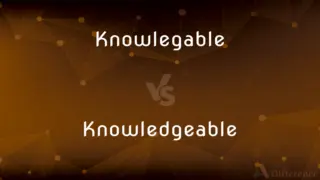Chemestry vs. Chemistry — Which is Correct Spelling?
Edited by Tayyaba Rehman — By Fiza Rafique — Updated on April 4, 2024
Chemestry is an incorrect spelling of chemistry. Chemistry, the correct word, is the scientific study of the composition, properties, and reactions of substances.
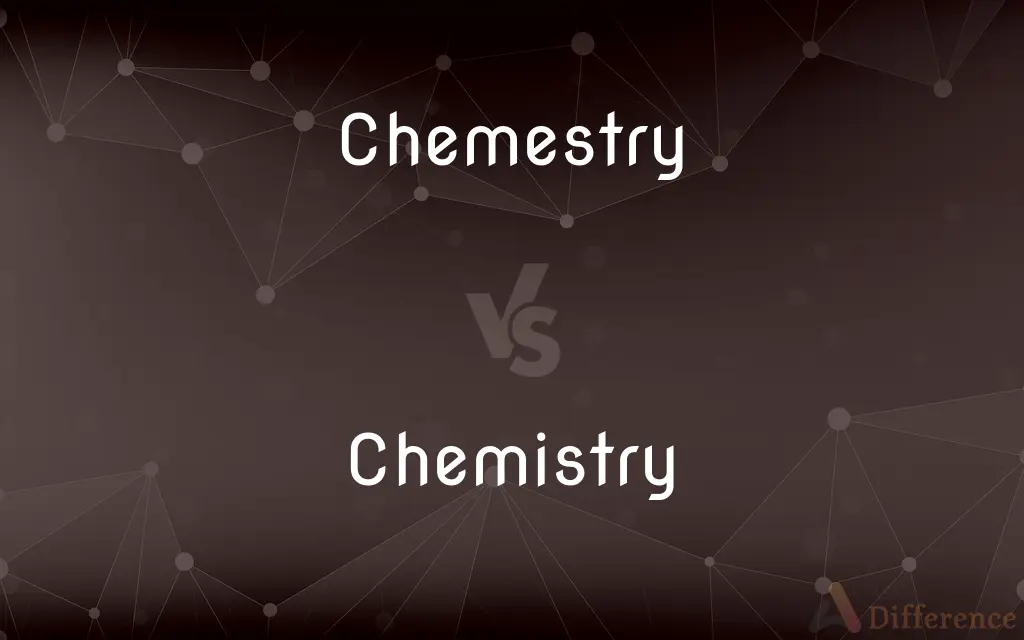
Table of Contents
Which is correct: Chemestry or Chemistry
How to spell Chemistry?

Chemestry
Incorrect Spelling

Chemistry
Correct Spelling
ADVERTISEMENT
Key Differences
Remember the correct spelling by thinking "There's 'i' in chemistry."
Pronounce chemistry as "kee-mis-tree," and chemestry as "kee-mes-tree."
Chemistry has "i-s-t-r-y" at the end, while chemestry ends with "e-s-t-r-y."
How Do You Spell Chemistry Correctly?
Incorrect: The chemestry between the two actors was undeniable.
Correct: The chemistry between the two actors was undeniable.
Incorrect: She plans to major in chemestry in college.
Correct: She plans to major in chemistry in college.
ADVERTISEMENT
Incorrect: Chemestry is my favorite subject in school.
Correct: Chemistry is my favorite subject in school.
Incorrect: The experiment demonstrated a basic principle of chemestry.
Correct: The experiment demonstrated a basic principle of chemistry.
Incorrect: I need to buy a textbook for my chemestry class.
Correct: I need to buy a textbook for my chemistry class.
Chemistry Definitions
The chemical industry and its manufacturing processes.
He works in the chemistry sector, developing new materials.
The emotional or romantic connection between two people.
There's undeniable chemistry between them.
The academic subject that teaches the principles and concepts of chemical science.
I'm taking a chemistry class this semester.
The scientific study of the composition, properties, and reactions of substances.
Chemistry plays a vital role in drug development.
The interactions and dynamics between elements or components within a system.
The chemistry between the team members improved productivity.
The science of the composition, structure, properties, and reactions of matter, especially of atomic and molecular systems.
The composition, structure, properties, and reactions of a substance.
The elements of a complex entity and their dynamic interrelation
"Now that they had a leader, a restless chemistry possessed the group" (John Updike).
Mutual attraction or sympathy; rapport
The chemistry was good between the partners.
(uncountable) The branch of natural science that deals with the composition and constitution of substances and the changes that they undergo as a consequence of alterations in the constitution of their molecules.
(countable) An application of chemical theory and method to a particular substance.
The chemical properties and reactions of a particular organism, environment etc.
(informal) The mutual attraction between two people; rapport.
That branch of science which treats of the composition of substances, and of the changes which they undergo in consequence of alterations in the constitution of the molecules, which depend upon variations of the number, kind, or mode of arrangement, of the constituent atoms. These atoms are not assumed to be indivisible, but merely the finest grade of subdivision hitherto attained. Chemistry deals with the changes in the composition and constitution of molecules. See Atom, Molecule.
An application of chemical theory and method to the consideration of some particular subject; as, the chemistry of iron; the chemistry of indigo.
A treatise on chemistry.
The science of matter; the branch of the natural sciences dealing with the composition of substances and their properties and reactions
The way two individuals relate to each other;
Their chemistry was wrong from the beginning -- they hated each other
A mysterious alchemy brought them together
Chemistry Meaning in a Sentence
Chemistry explains how cleaning products remove stains from clothing.
Understanding the chemistry of baking can help you become a better cook.
He loves reading about the chemistry of space and the elements found on other planets.
In chemistry, we learned about the periodic table and the elements.
Our teacher explained the role of chemistry in environmental protection.
By studying chemistry, we can understand how vitamins and minerals affect our health.
The water turned blue when we added the chemical during our chemistry experiment.
I need a new notebook for my chemistry class notes.
The fireworks show was a great example of chemistry in action.
In our chemistry class, we learn how to measure liquids accurately.
The chemistry lab has safety rules to prevent accidents.
She used a chemistry kit at home to conduct her own experiments.
Our chemistry project involves studying the effects of acid rain on plant life.
She found the chemistry section in the science museum really interesting.
The periodic table in chemistry class shows all known elements.
In chemistry, we did an experiment to see how different substances react with water.
The science fair had many projects related to chemistry, like homemade batteries.
Chemistry helps us understand how soap and water clean dishes.
The chemistry homework was to write a report on the structure of atoms.
Common Curiosities
What is the pronunciation of chemistry?
Pronounced as "kee-mis-tree."
What is the plural form of chemistry?
The plural form is also "chemistry."
Which conjunction is used with chemistry?
Various conjunctions can be used depending on the context.
Which vowel is used before chemistry?
"E" is used before "chemistry."
What is the singular form of chemistry?
The singular form is "chemistry."
Is chemistry a noun or adjective?
Chemistry is primarily a noun but can be used as an adjective in some cases.
What is the verb form of chemistry?
The verb form is "chemize," although it's not commonly used.
What is the root word of chemistry?
The root word is "chem."
Which preposition is used with chemistry?
Commonly used with "in" or "of."
Why is it called chemistry?
It's derived from the word "alchemy" and evolved to refer to the scientific study of matter.
Is chemistry an adverb?
No, it's not an adverb.
Is chemistry a collective noun?
No, it's not a collective noun.
Is chemistry a negative or positive word?
Neutral, neither negative nor positive.
Is the chemistry term a metaphor?
No, it's not a metaphor.
Is the word chemistry imperative?
It's not typically used as an imperative.
What is the first form of chemistry?
The base form is "chemistry."
What is the third form of chemistry?
There is no distinct third form.
Is chemistry an abstract noun?
Yes, when referring to the concept or field of study.
How do we divide chemistry into syllables?
chem-is-try.
What is the opposite of chemistry?
Lack of chemistry or discord.
Which determiner is used with chemistry?
"The" or "a" depending on context.
What is the second form of chemistry?
There is no distinct second form.
How many syllables are in chemistry?
Three syllables..
How is chemistry used in a sentence?
Chemistry is essential in understanding the composition of matter and its reactions.
Which article is used with chemistry?
"The" or "a" depending on context.
Is chemistry a vowel or consonant?
It contains both vowels and consonants.
Is chemistry a countable noun?
Yes, it's countable.
What is the stressed syllable in chemistry?
The second syllable, "mis."
What part of speech is chemistry?
Noun or, less commonly, an adjective.
What is another term for chemistry?
Chemical science or chemical study.
Share Your Discovery
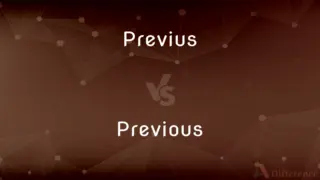
Previous Comparison
Previus vs. Previous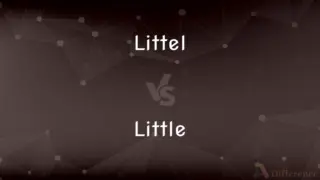
Next Comparison
Littel vs. LittleAuthor Spotlight
Written by
Fiza RafiqueFiza Rafique is a skilled content writer at AskDifference.com, where she meticulously refines and enhances written pieces. Drawing from her vast editorial expertise, Fiza ensures clarity, accuracy, and precision in every article. Passionate about language, she continually seeks to elevate the quality of content for readers worldwide.
Edited by
Tayyaba RehmanTayyaba Rehman is a distinguished writer, currently serving as a primary contributor to askdifference.com. As a researcher in semantics and etymology, Tayyaba's passion for the complexity of languages and their distinctions has found a perfect home on the platform. Tayyaba delves into the intricacies of language, distinguishing between commonly confused words and phrases, thereby providing clarity for readers worldwide.

